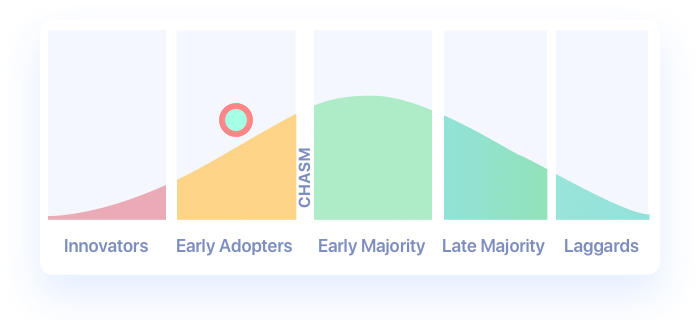Performance
Performance engineering encompasses the techniques applied during a systems development life cycle to ensure the non-functional requirements for performance (such as throughput, latency, or memory usage) will be met. It may be alternatively referred to as systems performance engineering within systems engineering, and software performance engineering or application performance engineering within software engineering.
Performance Engineering, in Hackernoon. Retrieved 2/24/2018. https://en.wikipedia.org/wiki/Performance_engineering
Position on the Adoption Curve

Presentations about Performance

Observability and Emerging Infrastructures

Lessons From a ~Yearly Re-Write of a Data Pipeline

Software Design for Persistent Memory Systems

High Performance Actors

C++ for Real Time Communications in the Cloud

PerfView: The Ultimate .NET Performance Tool

Unikraft - Unleashing the Power of Unikernels

Encryption Without Magic, Risk Mngmnt Without Pain

Cluster Consensus: When Aeron Met Raft

The Present and Future of Serverless Observability

Bigger, Faster and More Secure

Tools to Put Deep Learning Models in Production

An Engineering-Led Culture at Scale
Streaming Reactive Systems & Data Pipes w. squbs

Streaming Reactive Systems & Data Pipes w. squbs

How Performance Optimizations Shatter Security Boundaries

Java at Speed

Real-Time Data Analysis and ML for FraudPrevention

Applied Performance Theory

XDP in Practice: DDoS Mitigation @Cloudflare

Performance Management in the Wild

High Performance Java AMA w/ Gil Tene

Production Diagnostics for Node Applications

Profiling JVM Applications in Production

Mastering Microservices Monitoring with Prometheus

Mastering Microservices Monitoring with Prometheus
Interviews
PerfView: The Ultimate .NET Performance Tool
What's the primary focus of your talk?
I traditionally have been a Windows person. My first year as a developer was C++ on Windows. But at some point I became a performance diagnostic generalist. I do a mix of work that could be a Linux system, even embedded Linux, it could be .NET running on Windows, could be web applications, could be JVM. I don't deal with specific languages so much although I do still write code. I'm more interested in how the runtime works, in the interactions with the operating system, systems level stuff. That's where I find most interesting cases.
Can you tell us a bit about the motivation for your talk?
A lot of Windows developers only have in their toolbox some very expensive and not really 'wieldy' performance diagnostic tools. You could maybe use them in the development environment while you're writing the code, maybe even in load testing but not so much in production. A lot of the Windows profilers and the .NET profilers slow you down a lot, and they have really complicated installations required or they are very invasive. There's a bunch of problems which make them irrelevant for production even if it's a controlled production environment, and even worse if it is partially under your control, like a PaaS cloud offering where you're not really just running arbitrary code on the target machine. And this is where PerfView comes in. It's an open source tool. It was originally developed inside Microsoft for their own use troubleshooting and diagnosing issues with the .NET runtime itself and with various applications they had. One of the first users was the Bing team, and they have used it extensively until this day. But now it's a comprehensive tool for doing all kinds of performance analysis on Windows. It has a strong .NET focus but you can use it for C++ applications as well. What’s more, you can put PerfView in a production environment and grab data and move it back and forth.
See more interviews



